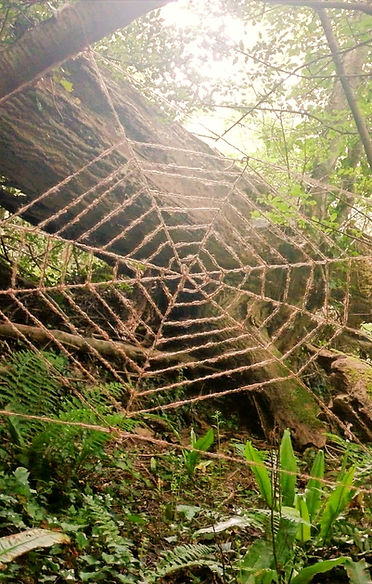Bookings Now Open! Next training will begin in November 2026!
Period of Study
Twelve weekends following the Celtic Tree Calendar
The course is comprised of 12 weekend workshops, Friday evening to Sunday afternoon, held each month for 12- months. There are a maximum of 16 participants, so early sign-up is encouraged as the demand is very high.
The course follows the Celtic calendar and runs from November through to October every other year. Attendance is one weekend per month throughout the year (including academic holidays) and participants, who will be encouraged to attend all twelve weekends to get the most from the course, will be required to attend at least ten in order to obtain their certificate.

Course Overview
What the course looks like...

Course Structure
Each weekend will be made up of the following:
| Friday Evening, 5.00pm – 7.30pm - Orientation to the weekend and Group Process |
| Saturdays 9.30am – 5.30pm - Studio Workshop and into Nature |
Practical and experiential environmental arts therapy workshops will focus on the following:
-
Themes associated with each month
-
Reference to the EAT resource book
-
Guided imagery
-
Symbolism; links to theory and mythology
-
Nature, metaphor and personal process
| Sundays 9.30am – 5.00pm - Skills Practice & individual/pair work in Woodland |
One-to-one environmental arts therapy sessions offered by and to participants in pairs followed by a group session. This will enable you to put what you have learned into practice, developing techniques, interpersonal skills and developing your relationship with the Natural environment.
-
Reflective learning focussed on the following:
-
Skills-based work outdoors
-
Facilitated learning in pairs to reflect the therapist/client dyad
-
Group reflective discussion
-
Theory Seminar and Clinical Supervision
Facilitated group discussion: focusing on developing skills and experience of workshop themes and their application to your clinical work. Theory will be explored in relation to the written assignments and support given in preparation for the final show.

Written Assignments
There are two written assignments, one on the theory and philosophy of environmental arts therapy and one on environmental arts therapy in clinical practice. The last weekend of the course includes a final show in which you will share and display your learning experience through a variety of mixed media presentations (can include visual art, dance/movement, music, ritual, performance etc.)
Who Can Apply?
This course is being offered to creative arts therapists who wish to specialise in the practice of Environmental Arts Therapy or who simply wish to enhance and extend their existing practice by working outdoors.
Applicants must be qualified HCPC registered arts therapists (art, drama, music), trainee arts therapists in the final year of an HCPC accredited Masters Programme, or UKCP registered dance movement psychotherapists.
Evidence of your qualification and professional registration as well as a current DBS check will be required.
Please note – this training is not validated by the Health & Care Professions Council and does not lead to professional registration with HCPC.

Course Accommodation
Private Camping Included During Summer
Included in your course fees is the exclusive use of the main camping field our venue, on Friday and Saturday nights from May to September. The beautiful camping field includes solar-powered hot showers and composting eco-toilets.
During the colder months of the year participants are required to organise their own accommodation. There may be some winter accommodation available on site for those travelling from further away, but this will be on a first-come-first-serve basis.


Course Fees
One weekend per month for 12 months
Course dates 2026/2027:
Twelve workshops over one year (generally on the second weekend of each month)
Course fees:
Course total for the year is £3600.
Fees can either be paid as a single payment, or broken down over the year as follows:
Pre-course booking deposit* by 01 Sep 2026
10% fee – £360.00
Enrolment fee by 03 Nov 2026
30% fee – £1080.00
Third payment by 02 Mar 2027
30% fee - £1080.00
Fourth payment by 06 July 2027
30% fee – £1080.00
In order to secure a place on the course we recommend paying your initial 10% deposit as soon as possible. We can only guarantee a place to those who have paid deposits.
This fee includes assessment of all assignments, end of year show and certification.
*Booking deposit and course fees are non-refundable.
How to Apply
Please apply in writing and include a CV and statement of interest and send by e-mail to: info@environmentalartstherapy.com
All other inquiries should also be sent to this email address.

